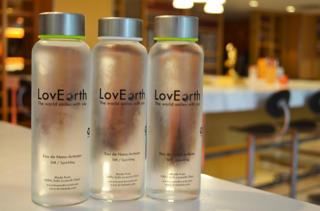Accor is a hotel group that runs over 630 hotels in 17 countries across Asia Pacific. In 2012, itlaunched PLANET 21 to set quantifiable sustainability goals for its hotels - and today, over 90% of those hotels reach all those goals, and 97% of hotels offer eco products.
Singapore, 7 May 2015. Using its PLANET 21 campaign as a guide, Accor hotels across all brands - Sofitel, Pullman, MGallery, Grand Mercure, Sebel, Novotel, Mercure, Adagio and Ibis - claimsignificant progress in reducing their environmental footprint. In Asia Pacific, waste recycling is practised in 86% of Accor hotels and 93% of them ban endangered seafood products such as shark’s fin (up from 71% in 2013). The group is progressing towards a total ban by 2015.
“PLANET 21 is more than just an environmental programme though, it is a clear pathway for our hotels to operate responsibly," says Michael Issenberg, Chairman and CEO Accor Asia Pacific.
The Green Meeting Package of Novotel Singapore Clarke Quay provides pens rolled out of used newspapers
That approach has allowed hotel managers across the region to implement a whole range of sustainable initiatives. Today, 97% of Accor's Asia Pacific hotels use eco-labelled products. Almost 90% organize disease prevention training for employees. And 97% of hotels offer healthy menu options (up from 87% in 2013) and 87% promote locally-grown produce (up from 82%, and exceeding the original global target of 70%).
One key initiative was the reduction in water consumption: since 2011, Accor regional hotels have achieved a 5.6% reduction in water usage. Additionally, it has worked with bakery company Bridor to reduce the environmental footprint of its baguettes and croissants served on a average of 56 million breakfasts a year. Improvements in the baking process have seen electricity and water consumption reduction by 10% and 30% over in the last two years.
As well, individual hotels are encouraged to raise the bar higher with employee-inspired initiatives. Novotel Singapore Clarke Quay now offers a Green Meeting package with environmentally-friendly meeting and catering facilities, and with a reforestation contribution. Novotel Hyderabad Convention Centres generate little or no waste due to strict waste management policies. And the four Accor hotels at Sydney Olympic Park, Australia use solar energy for electricity and hot water production.
Novotel Hyderabad Convention Centre uses innovative technology to treat sewage water into clear water that is used for gardening
Accor chairman and CEO Sébastien Bazin described Planet 21’s goal as such: “With customers claiming to be increasingly concerned about sustainable development challenges, PLANET 21 lets us make sustainable hospitality a reality.”
Accor says it is proud of its stance, and its progress. Today, it lists 91% of the network (more than 500hotels) as having achieved PLANET 21 goals in at least ten fundamental areas, up 11% from 2013. And guests can find eco-labelled and certified products at 97% of Asia Pacific hotels, as well as relish the fact that their Accor stays have resulted directly in the planting of 225,000 trees at ten regional sites in the last seven years. Even better, the reuse of laundry towels, group-wide has led to four million trees being planted at 150 sites planted in 21 countries - as well as giving €13 million in laundry savings.
"We have set firm commitments to protect our planet, its people and their environment,” said Issenberg.
More details: http://www.accor.com/en/sustainable-development/the-planet-21-program.html



 The Ibis Bencoolen has moved completely to recyclable glass drinks bottles instead of disposable plastic
The Ibis Bencoolen has moved completely to recyclable glass drinks bottles instead of disposable plastic